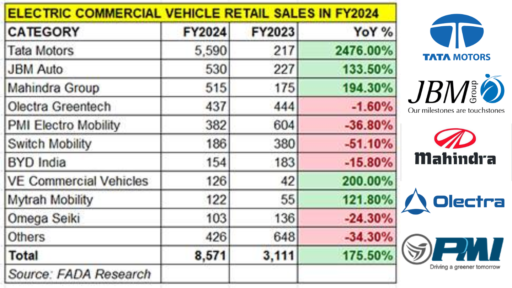
In the dynamic landscape of India’s electric vehicle (EV) sector, FY2024 witnessed a remarkable surge, with retail sales soaring to 1.67 million units, marking an impressive 42% year-on-year growth from the previous fiscal’s 1.18 million EVs. Among these, over 944,000 electric two-wheelers, experiencing a substantial 30% surge, constituted the driving force behind the growth of India EV Inc. Additionally, over 632,000 e-three-wheelers (up 57%) and more than 90,000 electric passenger vehicles (up 90%) were snapped up, showcasing the best-ever fiscal sales across these three vehicle segments.
The Federation of Automobile Dealers Association (FADA) recently unveiled the retail sales figures for the commercial vehicle (CV) segment, which is gradually transitioning towards electric mobility. Manish Raj Singhania, president of FADA, expressed astonishment at the staggering 175.5% year-on-year growth in electric commercial vehicles (eCVs), with 8,571 units sold, capturing a commendable 0.85% market share. Singhania emphasized the expanding base for EV adoption in India, affirming the accelerating shift towards electric mobility and the market’s receptivity to sustainable transportation solutions.
According to data sourced from Vahan, a total of 8,571 eCVs were retailed in FY2024, marking an impressive 175% year-on-year growth, albeit from a relatively low base in the preceding year.
Tata Motors, a stalwart in the commercial vehicle market, emerged as the frontrunner in eCV sales, retailing 5,590 units and commanding a robust 65% share in FY2024. While specifics regarding the types of eCVs sold remain undisclosed in Vahan’s data, it’s evident that Tata Motors boasts a diverse portfolio ranging from the compact Ace eEV to the urban-centric Ultra T.7 Electric intermediate eCV and Ultra e-buses. The company’s contribution extends beyond sales figures, with over 2,000 electric buses deployed across various Indian cities, collectively traversing more than 12 crore kilometers.
JBM Auto, a flagship entity of the JBM Group, secured the second position in eCV sales for FY2024, with 530 units sold, marking a commendable 133% increase from FY2023’s 227 units. The company, renowned for its electric tarmac buses at numerous airports nationwide, clinched substantial orders from State Transport Undertakings (STUs) and private entities. Notably, JBM Auto recently flagged off the maiden fleet of JBM Ecolife e-buses at the Panipat Bus Depot, underscoring its commitment to electrifying public transport.
The Mahindra Group secured the third spot in the eCV sales ladder, retailing 515 units, marking a remarkable 194% surge from the previous year’s sales of 175 units.
Despite facing a slight downturn of 1.60% year-on-year, Olectra Greentech, a prominent player in the electric bus domain, sold 437 units in FY2024. The company boasts an extensive order book exceeding 8,000 units and serves as a key supplier of electric buses to various STUs and municipal corporations across India.
PMI Electro Mobility, headquartered in Gurugram, reported retail sales of 382 units in FY2024, marking a decline of 37% from FY2023’s 604 units. Nonetheless, the company remains steadfast in its expansion endeavors, with plans underway to commission a second manufacturing plant in Pune by CY2025, doubling its total capacity to 6,000 units per annum.
Switch Mobility, the electric vehicle arm of Ashok Leyland, observed sales of 186 eCVs in FY2024, comprising buses and light commercial vehicles, marking a 51% year-on-year decline. Despite this setback, the company remains focused on its production targets, aiming to manufacture around 3,000 units per year to cater to various transportation needs, including cargo, refrigerated goods transport, and garbage collection.
In conclusion, FY2024 witnessed a paradigm shift in the commercial vehicle segment, with Tata Motors leading the charge in electric mobility and other key players swiftly adapting to the evolving landscape of sustainable transportation solutions.
